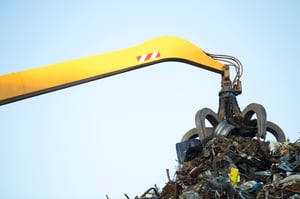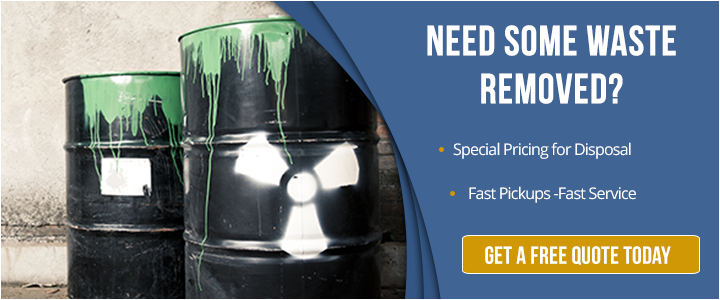While a hazardous waste disposal center accepts various types of hazardous waste, knowing where to take what is much more complicated.
In California, there are several types of hazardous waste disposal centers, from ones that accept household waste like cleaners and pesticides to treatment, storage and disposal facilities (TSDFs) that are more commonly used for industrial waste disposal.
What Is A Hazardous Waste Disposal Center?
A hazardous waste disposal center, also known as a hazardous waste management facility or hazardous waste treatment facility, is a specialized facility designed to handle and manage hazardous waste in a safe and environmentally responsible manner. These centers play a critical role in the proper disposal, treatment and containment of hazardous materials to protect human health and the environment.
treatment facility, is a specialized facility designed to handle and manage hazardous waste in a safe and environmentally responsible manner. These centers play a critical role in the proper disposal, treatment and containment of hazardous materials to protect human health and the environment.
The primary function of a hazardous waste disposal center is to receive, store, treat and dispose of hazardous waste generated by various sources, including industries, healthcare facilities, laboratories and other entities that produce hazardous materials. However, some hazardous waste disposal centers may simply be the initial stop before the waste is transported to another location for treatment and final disposal.
These centers are often equipped with advanced technologies, specialized infrastructure and trained personnel to handle the unique challenges associated with hazardous waste.
Types Of Hazardous Waste Disposal Centers
Household Hazardous Waste Center
There are several types of hazardous waste disposal centers in California. One of the most common ones is a household hazardous waste center. Homes can contain many types of hazardous products used for cleaning, painting, disinfecting and more. A hazardous household waste is typically anything that is labeled as being toxic, poisonous, combustible, corrosive, flammable or can cause irritation. Many times these products are not only found in the house but in a backyard workshop or garage. Examples of items a hazardous waste disposal center may accept from residents include:
- Abrasive cleaners
- Automotive products
- Chlorine bleach
- Disinfectants
- Drain cleaners
- Fertilizers
- Furniture and shoe polish
- Fluorescent light tubes
- Fungicides and herbicides
- Gasoline and diesel fuel
- Mercury thermostats
- Nail polish and nail polish remover
- Pest poisons
- Pool chemicals
- Propane tanks (small)
- Spray paints and paints
- Toilet bowl cleaners
- Used motor oil
These sites typically DO NOT accept explosives, ammunition, radioactive materials, trash, tires and household appliances like refrigerators, stoves and washing machines.
While these collection centers, which also may be known as drop-off facilities, mostly collect hazardous waste generated in the residential sector, they also collect some waste generated by small businesses or commercial entities.
In California, you may qualify as a Conditionally Exempt Small Quantity Generator (CESQG). In this case, you are permitted to use a Household Hazardous Waste (HHW) facility. State regulations define a business as a CESQG if it generates less than:
- 27 gallons or 220 pounds of hazardous waste per month, or
- 1 quart or 2.2 pounds of acutely hazardous waste per month
If your business generates hazardous waste in excess of these regulatory limits, you cannot use HHW facilities. Instead, you would need to transport your waste to the appropriate treatment, storage and disposal facilities for proper disposal.
TSDF
TSDFs play a crucial role in managing hazardous waste generated by industries, healthcare facilities, laboratories and other sources. They provide a controlled environment and specialized infrastructure to handle hazardous materials safely, ensuring compliance with environmental regulations and protecting public health.
It’s important to note that TSDFs are subject to stringent regulatory oversight and must obtain permits and comply with specific requirements to operate. Inspections, monitoring and record-keeping are essential components of TSDF operations to ensure compliance and accountability in hazardous waste management.
As a business, you’re also responsible for ensuring the proper transportation of your hazardous waste to TSDFs, which we’ll further explain later in this article.
Specialized Hazardous Waste Disposal Center
In addition to household hazardous waste centers and TSDFs that larger industrial companies use to help manage their waste, there are several specialized hazardous waste disposal centers that include:
- E-waste disposal or recycling facilities: These centers focus on the safe disposal and recycling of electronic waste, which includes old computers, televisions, mobile phones, monitors and other electronic devices that contain hazardous materials like lead, mercury and cadmium.
- Medical waste disposal facilities: These types of disposal centers can focus on individual aspects of medical waste as well, from sharps drop-off services to pharmaceutical waste disposal, dental waste management and biohazard waste disposal (pathological waste, infectious waste, etc.).
- Asbestos disposal centers: Asbestos disposal centers are specialized facilities that handle the safe and proper disposal of asbestos-containing materials (ACMs). Asbestos is a mineral fiber that was commonly used in various construction materials due to its heat resistance and durability.
- Polychlorinated biphenyl disposal centers: PCB (polychlorinated biphenyl) disposal centers are specialized facilities that handle the safe and environmentally responsible disposal of materials containing PCBs. PCBs are a group of toxic synthetic chemicals that were widely used in electrical equipment, hydraulic systems and other industrial applications until their production was banned in many countries due to their harmful effects on human health and the environment.
Why You Need Proper Transportation To A Disposal Center
The more hazardous waste you generate, the more demanding your disposal and transportation requirements that your business must follow will be, whether you’re a small quantity generator (SQG) or a large quantity generator (LQG).
Even if you qualify as a Conditionally Exempt Small Quantity Generator, you’re still responsible for ensuring that the waste your business generates is properly and safely disposed of. Although you may be able to drop off your waste at one of the hazardous waste disposal centers we mentioned above, many businesses opt to work with hazardous waste disposal companies in order to comply with cradle to grave requirements. Cradle to grave is another way of saying you’re responsible for your company’s waste from its initial generation through disposal.
Improper hazardous waste disposal practices can have a long-term impact on your company, which is why it’s essential to work with a reputable hazardous waste transporter and disposal company.
The best disposal company will:
- Identify wastes through sampling and testing procedures
- Transport the wastes to the appropriate recycling and disposal sites
- Prepare labels, manifests and other paperwork needed for transport
- Offer prompt pickups when you need them
- Address any cost concerns you have along the way
- Assist you with packaging your waste in the appropriate containers so that you can avoid fines
- Offer a walk-through program to help you identify any potential problems or provide information on potential cost-savings measures
The best hazardous waste disposal pick up services are familiar with state and federal regulations, including how they define large vs. small hazardous waste generators. This is important for your bottom line because a company’s waste generator status is measured on a monthly basis. Companies can go from one category to another from month to month based upon changes in production.
Make sure the hazardous waste disposal company that you work with is licensed and regulated by checking the California Department of Toxic Substances Control’s Registered Hazardous Waste Transporter Database.
An experienced disposal company can help you navigate state and federal laws and ensure your waste safely arrives at the appropriate hazardous waste disposal center.


Comment